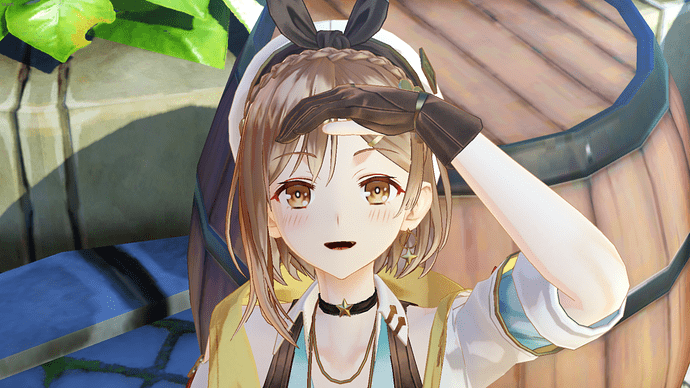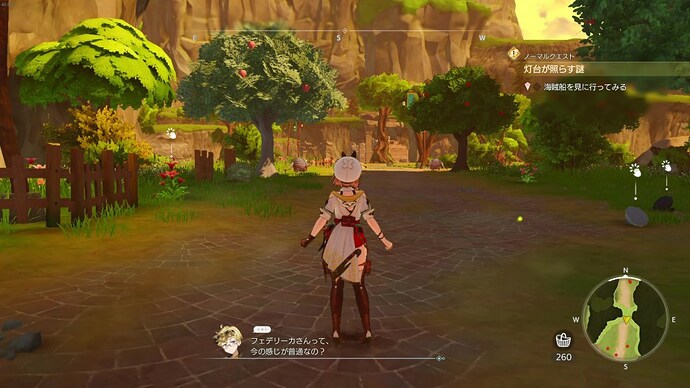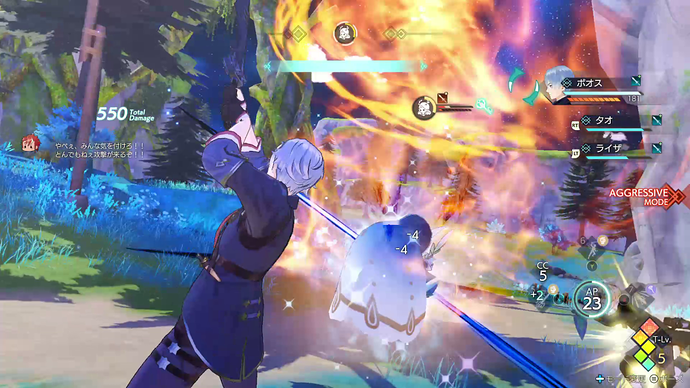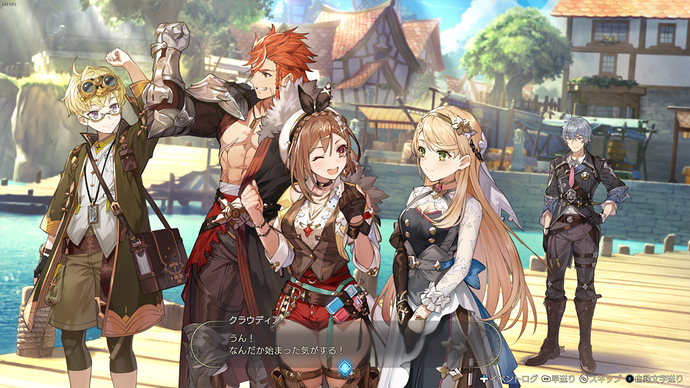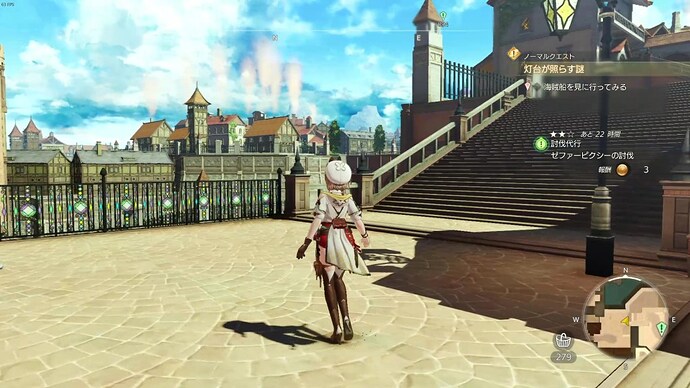Originally published at: Review | Atelier Ryza 3: Alchemist of the End & the Secret Key - XboxEra
You know, I’ve been fairly impressed by Gust, creators of the Atelier series of games and developer of Atelier Ryza 3: Alchemist of the End and the Secret Key. Long English title aside, the company has done well on improving how their games play since they’ve transitioned to 3D development many moons ago. And although I miss the 2D sprites of their older games I’ve long since come to terms that that era of gaming has more or less come to a close, at least for the majority of companies.
I’ve not been too big on any of the 3D Atelier games and, honestly, the one Atelier I fondly remember is Atelier Annie on the Nintendo DS. Up until this entry, none of the games past Annie and her adorable lazy antics have stuck with me, which says a lot about Ryza 3 because I really enjoyed this game. Easily the best Gust game I’ve played in years, even. But allow me to refer you to my Atelier for my reasons.
Atelier-ing
Picking up some time after the events of the second game, where artificial islands called the ‘Kark Isles’ have popped up and are making a ruckus for everyone, earthquakes and the like included. Ryza and her friends, old and new, look to explore the isles and find out what came before and what good the Secret Keys are. As its namesake implies, a core component of Ryza’s gameplay revolves around creating stuff: you know, alchemy. You craft everything from armour to weapons, core components for bigger items, foods, you name it.
And to do this, you’ll be spending a lot of time smashing up cities and your local island forests to build up an arsenal of ingredients, so you don’t run into that one recipe that requires a specific component you’ve run past a bunch of times. Either that, or you’ll be beating up baddies—from the cute to the exotic—for their items or to advance the game’s story if they’re a roadblock.
A lot of your time will likely be spent on creating. As you concoct new items, you get ‘SP’ (special points, I think) which can be used on Ryza’s skill tree. This skill tree unlocks bonuses to gathering stats and is one of the ways you can find recipes to work with. Combining the resources needed to build an item is as simple as following the onscreen crafting menu, which will tell you what goes where and how valuable the resource is. It’s important I mention that ingredient ratings are important because they will allow you to apply particular traits to whatever it is you’re concocting. If you’re making a tonne of something, there is an easy option of letting the game automatically placing the right amount of ingredients too, a quality of life feature I appreciate.
I’ve found that the better the tools I’ve made, the easier it was to get better quality ingredients, which meant I needed to go gathering a bunch. And the thing is, Ryza’s hometown and everything around it are big and mostly wide: many a straight road but they’re filled to the brim with resources to collect and enemies to fight. Besides gathering spots, these roads and towns will have random side quests pop up, which usually entails either fighting baddies or giving some ingredients to one of the many NPCs walking about.
Completing them gives SP, extra items, or more battle exp which you’ll need to make sure you’re keeping up with. It’s a good idea to get through as much of the story as possible to open up more areas you can access, as this game does the good ol’ invisible walls or conveniently broken bridges to gate you from areas before the proper story telling happens. I found myself spending hours breaking personal property and chopping many a forest down or getting caught up in whatever random event occurred.
Teleporting around the map makes all this pretty convenient too, as there a lot of landmarks you can discover that act as fast travel points. Considering the scale of this game, I highly recommend you find as many of them as possible and open up your map. Speaking of which, the map menu isn’t very convenient. Getting a micro level view of where you’re at takes more button presses than I think are necessary, and as far as I could tell there is no way to have a transparent on screen map to view. Certainly made exploration more annoying than it had to be, but not the end (heh) of the world.
This games gives me odd sense of catharsis, and I think it has something to with how laidback the game feels. That and Koei’s BGM team has made for some relaxing tracks. But I’ll touch on that shortly.
Magical Keys
I haven’t even touched on one of the game’s core mechanics: Keys. The these come to life as Ryza explores the Kark Isles, offering bonuses not just to combat and alchemy, but also open up sealed off locations all across the map. You create keys by either going to a landmark once its fully charged, or by fighting enemies where you can create them mid-combat. There are a lot of different keys you can make, and beyond their uses in the map the combat bonuses they offer come in handy when a fight is lasting just a bit too long. You’ll need to make the most of your keys if you want to get some of the better ingredients, and if you think you’ll forget your party will always tell you to make a key during combat.
Now the combat system I have mixed feelings on. It’s a ‘real-time’ battle system, one that caught me by surprise as I was used to the usual turn-based combat from the older games. All belligerents have to wait for their turn to come through the form of a filled wait circle, where we can string a chain of combos by pressing the B button and using skills and/or swapping out with a character from the backrow to continue your combo. Using particular skills at certain times will trigger a free magic or physical attack from allies like Bos’ or Klaudia, and the best way to abuse this is to keep switching party members to keep the flow of battle going.
It’s not by any means bad, heck when you string a chain of attacks on an enemy it feels pretty satisfying. How it encourages you to keep switching characters to keep damage output high along with the bonuses provided by keys and other items you can craft makes for fun fights. But the game doesn’t let you walk around combat areas. Nor does it let you move the camera, and the camera does the whole thing where it shoves itself right close enough to your character you can admire the handy texture work of their clothes. I would find myself preemptively blocking more than I’d like to prevent being hit by enemies I couldn’t see. This could be fixed just by letting the camera give a more center view of the fight, which I hope is something Gust adds to the game in the future.
Take Your Time
I’ll keep tightlipped on Ryza’s story. There’s not much to go on at least for me, as I’ve only ever touched the first game and for a few hours at best. This game’s narrative gives brief descriptions and handy little references you can read up on during dialogue if you need catching up on a character’s title and whatnot, so I never felt left out. Well, at least when Ryza and company don’t reminisce to past events, and they do that often enough that it made me feel like I don’t reminisce enough—and these characters are at least a few years younger than me. Ryza herself is such a happy go lucky character too and a nice change of pace from the brooding and frankly speaking unlikeable characters I’ve been having to put up with lately. She could use a bit more of a fight or flight response though, but I think that’s the trait of every shounen slash shoujo character that so many people like.
Ultimately, what really makes this game’s story for me is that, despite the problems that arise, both to Ryza’s homeland and some interpersonal character challenges, the game is very much laidback. This is sort of Atelier’s thing, especially once they dropped the deadlines to main story objectives some time ago. The games generally don’t give narrative reasons to make you run to the next story beat, because you’d feel bad leaving critical business behind while you spend hours of your life doing alchemy.
Coming off so many games that make the player feel like they need to continue the main story because they’d otherwise feel irresponsible, Ryza is such a nice fresh of breath air. I love taking my time to do things and the sense of patience from the pacing of the game’s story and its characters lend well to that feeling of catharsis I mentioned earlier. It’s such a relaxing game.
For the technicalities: Ryza 3’s PC port is a bit middling. Compared to other Koei Tecmo releases on Steam, Ryza 3 runs pretty well. But it doesn’t run well enough, as even on an RTX 3070 the game struggles to hold 60 frames per second while you’re running about. There are also some weird issues with the graphics, lots of pop-in even at the highest settings, aliasing issues, and the depth of field in particular almost looks broken; It’s really hard to see anything with it on, so I highly recommend you turn that off. Forget about keyboard and mouse controls as they’re a bit unpleasant, it’s controller or bust.
I can best summarize my review of Atelier Ryza 3: Alchemist of the End & the Secret Key as such: this is easily Gust’s best Atelier game. Offering a fun and relaxing experience for those that want to craft and battle away, this is the best final chapter Ryza could ask for.
And food for thought: it’s nice that the PlayStation 3 era of Japanese RPG is still with us in spirit.
